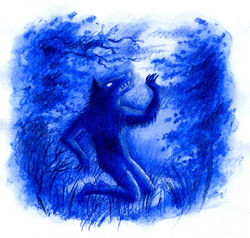TIP: Stejně jako všude na našem webu, i zde máte možnost využívat náš slovníček. Stačí dvakrát kliknout na neznámé slovíčko v textu, počítač vám ho sám vyhledá a výsledek zobrazí.
TIP: Povídku si nyní můžete přečíst a poslechnout také ve video formátu.
Gabriel-Ernest
Saki
(adapted by Marek Vít, read by Waylan Bram)

ilustrated by M. Vydrová, © 2007
“There is a wild animal in your woods,” said the artist Cunningham, as Van Cheele was driving him to the station. It was the only thing he said during the journey, but Van Cheele hardly noticed that.
“A fox or two,” he said, “nothing worse.” The artist said nothing.
“What did you mean about a wild animal?” Van Cheele asked when they were on the platform.
“Nothing. My imagination. Here is the train,” said Cunningham.
That afternoon Van Cheele went for a walk through his woods, as usual. He knew the names of many wild flowers and he was a great walker. What he saw during his walks always provided topics for conversation afterwards, but what he saw on that particular afternoon was something completely new to him. On the bank of a deep pool was a young boy of about sixteen. He was lying on the ground, drying his wet hair and skin in the sun. His light brown eyes were watching Van Cheele lazily.
“Where did this wild-looking boy come from?” Van Cheele thought. The miller's wife had lost a child about two months before, but that had been a baby, not a half-grown boy.
“What are you doing here?” Van Cheele asked.
“Sunning myself, as you can see,” the boy answered.
“Where do you live?”
“Here, in the woods.”
“You can't live in the woods,” said Van Cheele.
“They are very nice woods,” said the boy.
“But where do you sleep at night?”
“I don't sleep at night. It's my busiest time.”
“What do you eat?”
“Meat,” the boy answered, pronouncing the word very slowly, as if he was tasting it.
“Meat! What meat?”
“Rabbits, hares, chickens, lambs sometimes, children if I can get any, but they are usually well locked in at night, when I do my hunting. It's more than two months since I had child meat.”
Van Cheele ignored the boy's last words. “Our hares are not easy to catch,” he said.
“I hunt on four feet,” the boy answered.
“Do you mean that you hunt with a dog?”
The boy rolled over and laughed in a strange low voice. “I don't think any dog would be very happy to be in my company, especially at night.”
Van Cheele began to feel that there was something unnatural about this strange boy.
“You can't stay in these woods,” he said strictly.
“I think you would rather have me here than in your house,” said the boy.
The thought of this wild, naked animal in Van Cheele's beautiful house was alarming.
“If you don't go, I'll have to make you,” said Van Cheele.
The boy turned like a flash and jumped into the pool. A moment later he climbed out on the bank where Van Cheele was standing. Van Cheele's foot slipped as he made a step backward. He found himself lying on the ground, with those tigerish yellow eyes not very far from his own. Almost instinctively he raised his hand to his throat. The boy laughed again and disappeared in the bushes and trees.
“What an interesting wild animal,” Van Cheele thought as he picked himself up. Then he remembered what Cunningham had said earlier: “There is a wild animal in your woods.”
As he was walking home, Van Cheele started to think about all the strange things that had happened in the woods recently and wondered if they had been caused by this wild young boy.
There were fewer animals in the woods now and farmers had been complaining about stolen chickens and lambs. Was it possible that the boy had really been hunting in the countryside at night with a pack of dogs? And then Van Cheele stopped. He had just remembered the child missing from the mill two months ago. People had thought that it had fallen into the river and was carried away by the current. But the mother had said that she had heard a scream from the hillside, not from the water. He wished the boy had not said that about eating child-meat two months ago. You should not joke about such terrible things.
At dinner that night he was very silent.
“What's happened to you?” his aunt asked. “You look as if you've seen a wolf.”
Because Van Cheele didn't know the old saying, he thought that his aunt was rather foolish. If he had seen a wolf in his wood, he would be extremely busy talking about it.
In the morning he was still feeling worried so he decided to take a train to the neighbouring town and ask Cunningham what he had really seen in the woods. But as he entered the living room, he suddenly fell silent. Lying on the sofa was the naked boy from the woods.
“What are you doing here?” Van Cheele asked angrily.
“You told me not to stay in the woods,” the boy replied.
“But you can't come to my house! What if my aunt saw you!” He quickly covered as much of the boy's naked body as possible with the morning paper. At that moment his aunt entered the room.
“This is a poor boy who has lost his way–and lost his memory,” Van Cheele explained. “He doesn't know who he is or where he comes from.”
Miss Van Cheele was very interested. “Perhaps he has got his name on his underwear,” she suggested.
“It seems that he's lost his underwear, too,” Van Cheele said, making sure that the newspaper stayed in its place.
Miss Van Cheele was as excited as if she had found a little kitten or a puppy. “We must do all we can for this poor boy,” she decided.
They gave him a bath, dressed him in clean clothes and combed his hair. Van Cheele could still see the wild look in the boy's eyes, but his aunt thought he was sweet.
“We must give him a name until we find out who he really is,” she said. “Gabriel-Ernest, I think. Those are nice names.”
Van Cheele agreed but he was afraid that the boy was not as nice as the names his aunt had chosen. He was even more certain now that their dog had disappeared from the house and was shivering and barking unhappily at the far side of the garden. Van Cheele decided to find Cunningham immediately.
As he drove to the station, his aunt was planning an afternoon tea where Gabriel-Earnest should help her to entertain little children from her Sunday school class.
At first, Cunningham did not want to tell Van Cheele much. “My mother was crazy when she died,” he explained, “so you will understand why I can't believe my eyes when they see something fantastic and impossible.”
“But what DID you see?” Van Cheele asked.
“I thought I saw something extraordinary. The last evening I was with you, I was standing in the orchard, watching the sunset. Suddenly I noticed a naked boy who was also watching the sunset. He looked like a wild creature from a myth. He was so fascinating that I wanted to ask him to be my model. But the next moment, as the sun disappeared from sight, the boy vanished, too.”
“What? Just vanished?” Van Cheele said excitedly.
“No, and that's what makes it so terrible,” the artist answered. "Instead of the boy, there was a large black wolf with horrible teeth and evil yellow eyes.
Van Cheele waited for nothing and started running at top speed towards the station. He rejected the idea of sending his aunt a telegram. She would probably think that “Gabriel-Ernest is a werewolf” was a code message to which he hadn't given her the key. He hoped that he would reach home before sunset.
His aunt was cleaning up some unfinished jam and cake when he finally arrived.
“Where is Gabriel-Ernest?” he almost screamed.
“He is taking the little Toop child home,” said his aunt. “It was getting late so I thought it wasn't safe for a little child to walk back alone. What a lovely sunset, isn't it?”
Van Cheele did not stay to discuss the beauty of the evening sky. He ran along the narrow road which led to the home of the Toops. The sun suddenly went down and the landscape was covered with grey light. And then Van Cheele heard a scream in the distance, and stopped running.
No one ever heard of the two boys again. Gabriel-Ernest's clothes were found lying on the road by the river, so people thought that the Toop child had fallen into the water and that the boy had stripped and jumped in to save the little one. Miss Van Cheele, who was very sad over the loss of the boy she had found, had a memorial put up in the church. It read:
To Gabriel-Ernest, an unknown boy,
who bravely gave his life for another.
Autor povídky: Saki, 1870–1916, britský spisovatel proslulý především svými satirickými povídkami
Autorka ilustrace: Markéta Vydrová, výtvarnice, ilustrátorka knih především pro děti a mládež.
Méně známá slovíčka z této povídky si můžete prostudovat a
nacvičit zde:
Okruhy slovní
zásoby: Gabriel-Ernest
Původní nezjednodušenou verzi této povídky si můžete
přečíst zde:
Saki:
Gabriel Ernest (full)









